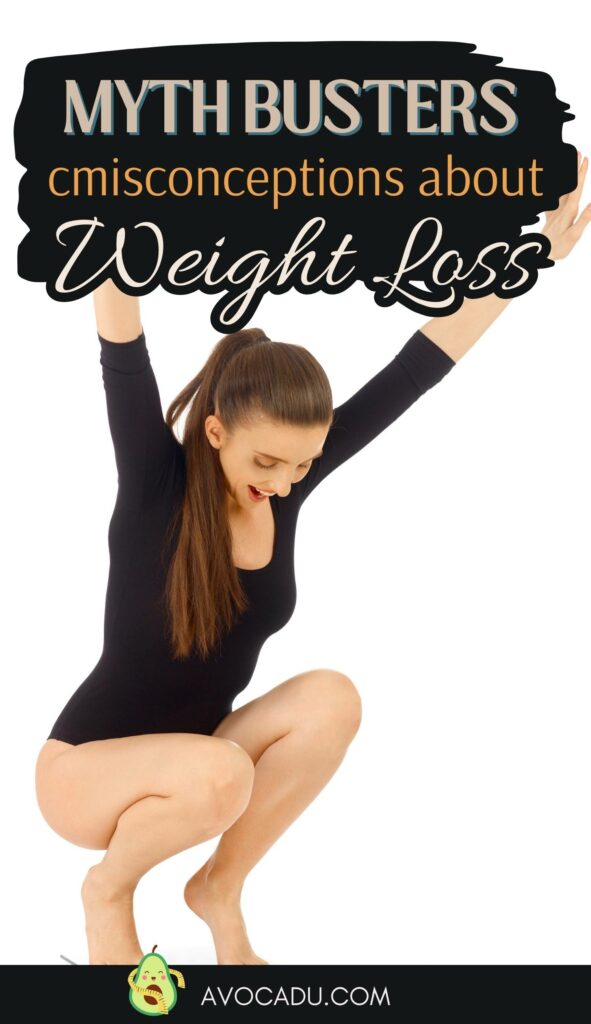Top 7 Weight Loss Misconceptions and How to Overcome Them
It’s time for some real talk. We’ve all heard the rumors, the half-truths, the so-called ‘advice’ that echoes through the fitness world, but how much of it actually holds water?
Weight loss information can often feel like a bewildering maze, leaving us feeling lost and confused. It’s time we smash those pesky weight loss misconceptions once and for all!
No more wandering aimlessly in circles; we’re diving headfirst into the heart of the labyrinth, armed with a beacon of empowering truth to dispel the shadows of misinformation.
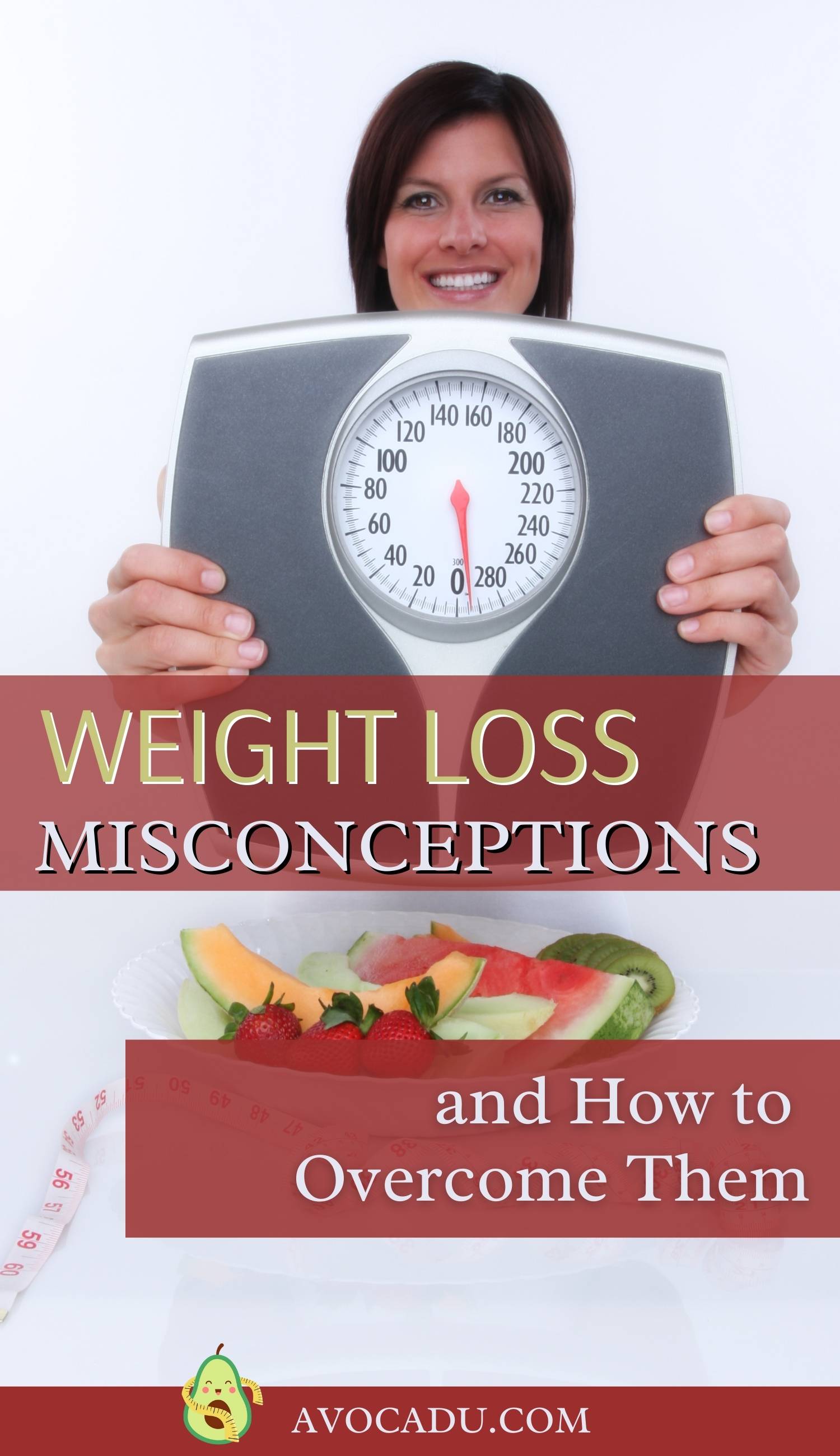
This post may contain affiliate links, which helps keep this content free. Please read our disclosure for more info.
1. “The Diet Food Deception”
Let’s start with a common misconception many of us encounter on our weight loss journeys: the allure of diet foods.
On the surface, these products, with their attractive labels boasting “low-fat”, “sugar-free” or “zero calories”, seem like they should be beneficial for weight loss. However, these diet foods are often not as helpful as they seem.
These products typically replace fat and sugar with artificial sweeteners and other additives to maintain taste. Unfortunately, our bodies often have trouble processing these artificial ingredients, which can lead to slower metabolism and trigger cravings, potentially causing weight gain instead of weight loss.
Thankfully, there are still plenty of options that can support your weight loss journey! Switching to whole, natural foods can make a significant difference.
Instead of diet soda, try sparkling water infused with fresh fruits like strawberries or raspberries for a refreshing drink without the artificial sweeteners.
And rather than opting for sugar-filled, low-fat yogurt, consider having Greek yogurt, which is high in protein. Add some fresh berries on top for a nutritious and satisfying snack.

Making these types of changes towards healthier, more natural food choices can have a big impact on your weight loss efforts. It’s all about sustainability and understanding what’s truly beneficial for your body.
2. “The Fat Fallacy”
The infamous phrase “fat makes you fat” has led to a decades-long fear of all things fat, prompting us to banish foods like avocados and nuts from our plates. But it’s time to overturn this misconception and invite these nutritious goodies back to our meals.
Despite popular belief, your body needs fats to function optimally. Fats serve as a concentrated source of energy, making them vital for your body’s daily operations.
They’re not the villain they’ve been portrayed as; instead, they’re more like unsung heroes, quietly working in the background to keep us healthy.
In particular, monounsaturated and polyunsaturated fats (found abundantly in foods like avocados, nuts, and fish) actually help lower levels of harmful cholesterol while increasing beneficial cholesterol. That’s a win-win for heart health.
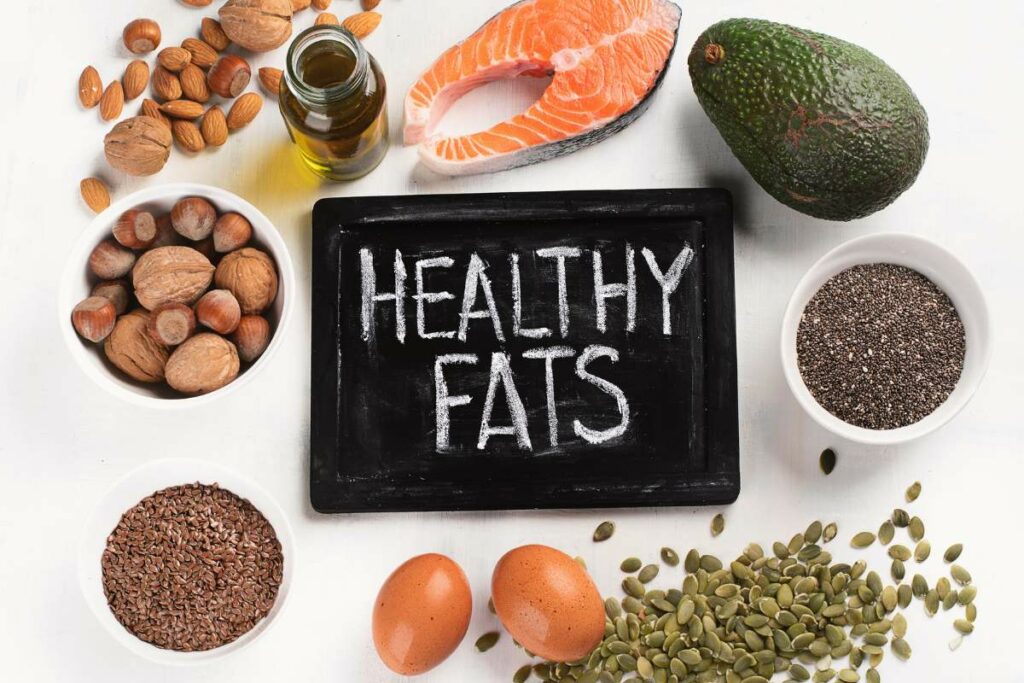
And let’s not forget about fat-soluble vitamins – A, D, E, and K. Without sufficient fat in your diet, your body struggles to absorb these essential vitamins, which support everything from our immune system to our bone health.
It’s time to give healthy fats the credit they deserve. Add a sprinkle of nuts to your salad for a satisfying crunch, or spread some ripe avocado on your toast for a creamy, nutrient-rich breakfast.
Enjoying healthy fats in moderation can be part of a balanced diet, so there’s no need for fat fear anymore!
3. “The Calorie Conundrum”
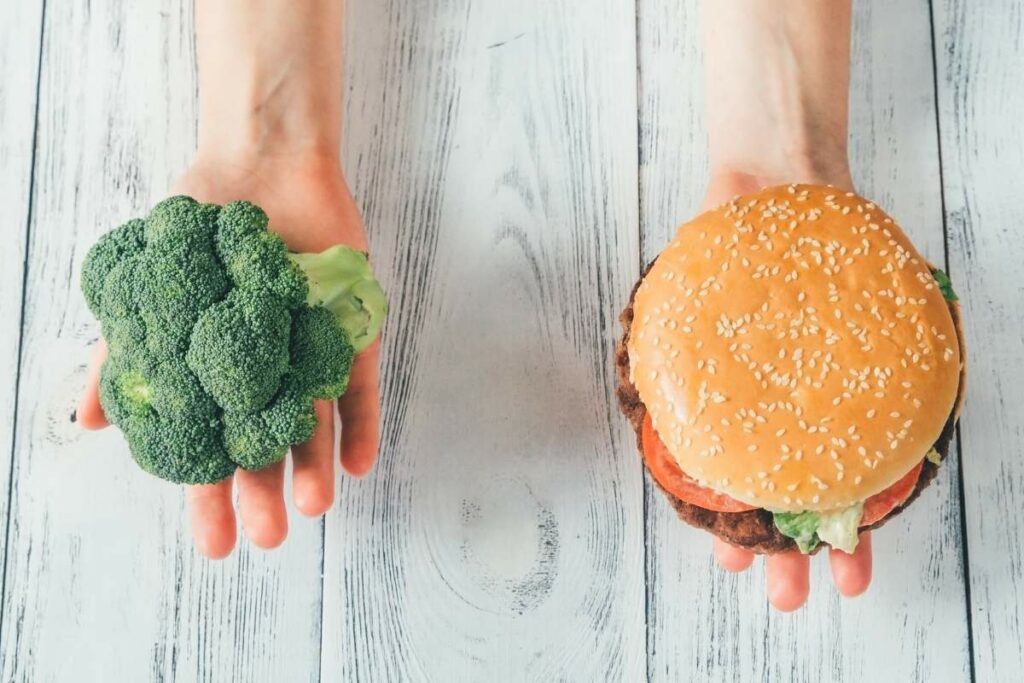
The “all calories are equal” belief has persisted in weight loss conversations for far too long. At face value, it makes sense — after all, a calorie is a unit of energy. However, when it comes to nutritional value and your overall health, not all calories are created equal.
Consider this: 100 calories of soda and 100 calories of broccoli do indeed offer the same amount of energy. But, that’s where the similarity ends.
The soda offers little more than sugars, leading to a quick energy burst followed by a crash. Meanwhile, the broccoli brings a host of nutrients to the table, including fiber, vitamins, and minerals, with a steady release of energy.
The soda may also stimulate a cycle of cravings due to its sugar content, while the fiber in broccoli helps keep you feeling satisfied longer, thus aiding in weight management. So, it becomes clear that the nutritional context of calories matters greatly.
Related Article: 8 Easy Ways to Cut Down on Sugar
Shifting focus from calorie-counting to nutrient-rich foods can significantly enhance your health and weight loss journey.
Foods high in fiber, protein, and healthy fats not only provide essential nutrients but also help you feel full, which can curb overeating.
So, next time you’re preparing a meal, fill your plate with vibrant, nutrient-dense foods like fruits, vegetables, lean proteins, and whole grains. Your body will indeed thank you, and your taste buds will too!
4. “The Oversimplified Solution: Eat Less, Move More”

“Eat less, move more” has become the oversimplified rallying cry of many weight loss plans. It seems straightforward enough, but our bodies are not that simple. They’re beautifully complex, finely-tuned systems, and can’t be reduced to a catchy phrase.
The phrase implies that weight loss is a simple equation: if you consume fewer calories than you burn, you’ll lose weight.
While there’s some truth in this, it neglects the complexity of our bodies’ metabolic processes, and how different foods can affect hormones and hunger levels. It also overlooks the importance of the types of foods we eat, not just the quantity.
Weight loss and health are not just about diet and exercise. While those are key components, a truly holistic approach acknowledges the importance of other factors.
Regular doctor’s checkups are essential to monitor your health and catch any potential issues early.
Stress management plays a significant role too, as chronic stress can lead to overeating and disrupt normal bodily functions.
Incorporating activities like yoga, meditation, or simply spending time doing things you love can significantly help in managing stress and promoting mental well-being.
And let’s not forget the importance of a good night’s sleep. Quality sleep is crucial for the proper functioning of our bodies, including our metabolism.
In essence, it’s about respecting your body’s complexity and treating your health journey as a multi-faceted process rather than a single strategy. It’s time we redefine the narrative, ladies: eat healthily, move joyfully, rest sufficiently, and care for your mind.
5. “The Weight-Health Dichotomy”

One of the most enduring myths in our society is the equation of thinness with healthiness, and conversely, fat with unhealthiness. It’s time to bust this myth wide open.
Your health cannot be solely defined by the number on the scale or the size tag on your dress. It’s a comprehensive measure of your overall wellness, encompassing physical fitness, mental resilience, and emotional well-being.
In fact, it’s entirely possible for someone who wears a larger size to have excellent cardiovascular health, strong muscles, and great endurance. They might run a 5K with gusto and have blood pressure within a healthy range.
On the flip side, someone wearing a smaller size may have less muscular strength, poor endurance, or even hidden health issues like high cholesterol.
Also, mental health is a significant component of overall health, which isn’t reflected in body size. People of all shapes and sizes can experience issues like stress, anxiety, or depression.
Instead of focusing on dress sizes or scale numbers, let’s shift our attention to fitness, flexibility, strength, mental health, and how we feel in our bodies.
Regular exercise, a balanced diet, sufficient sleep, routine medical check-ups, and taking care of our mental health should be the cornerstones of our health journey, not just a number on the scale.
6. “The Linear Weight Loss Fallacy”
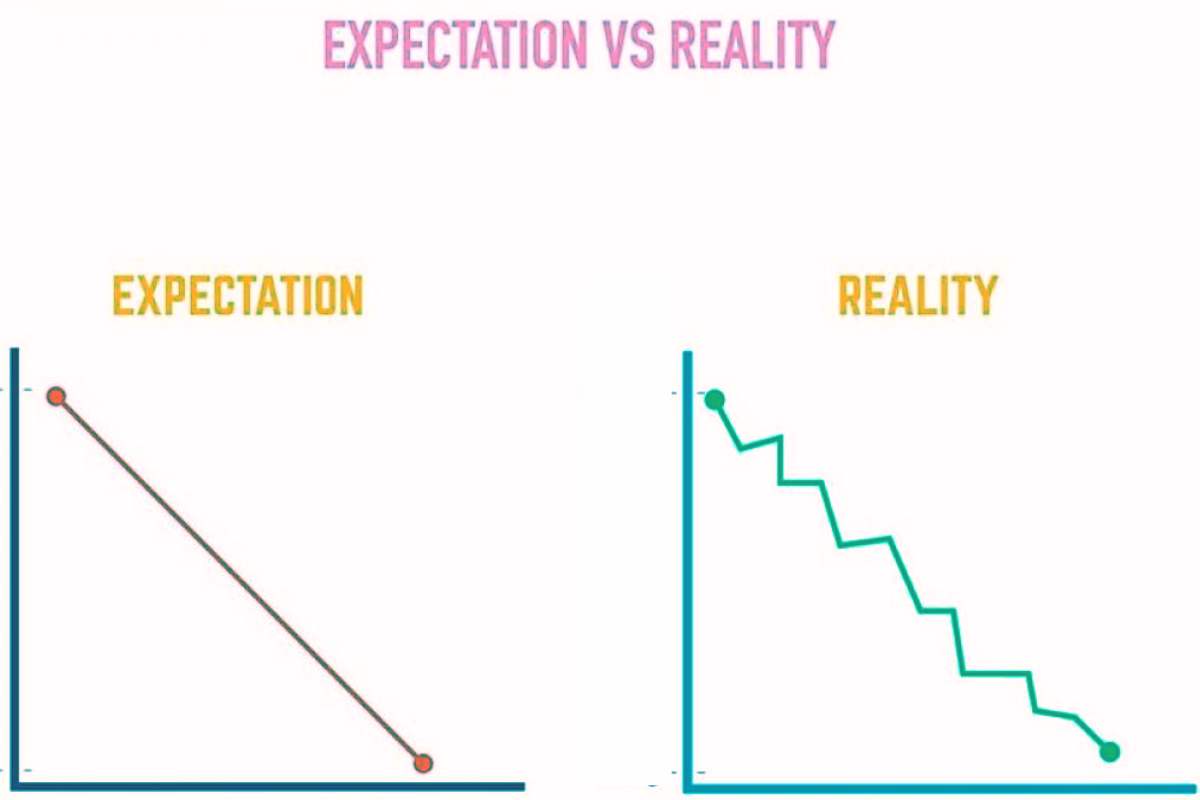
Many of us start our weight loss journey expecting a steady, downwards slope on the scale. But the truth is, weight loss rarely follows a straight line.
If your weight loss journey feels more like a roller coaster ride, complete with its ups and downs, know that you’re not alone. This is the norm, not the exception.
Related Article: Hit a Weight Loss Plateau? 5 Steps to Busting Through It!
Weight fluctuation is a normal part of the weight loss process, influenced by various factors like water retention, hormonal changes, and muscle gain.
You might shed a few pounds one week, stay the same the next, or even see a little increase. But don’t let that discourage you. It’s not a sign of failure; it’s simply a sign of being human.
Remember, true success in weight loss isn’t measured by the rigidity of the process, but rather by your commitment to a healthier lifestyle.
Are you nourishing your body with whole foods? Are you moving regularly in ways that you enjoy? Are you treating yourself with kindness and patience? If the answer is yes, then you are succeeding, no matter what the scale says.
Instead of getting fixated on the numbers, focus on how you feel.
Do you have more energy? Do your clothes fit better? Are you sleeping well and feeling happier? These are the real victories.
Weight loss is more of an adventure with its twists and turns than a straight-line race. As long as you’re feeling healthier and happier, you’re absolutely winning!
7. “The Willpower Over Biology Blunder”
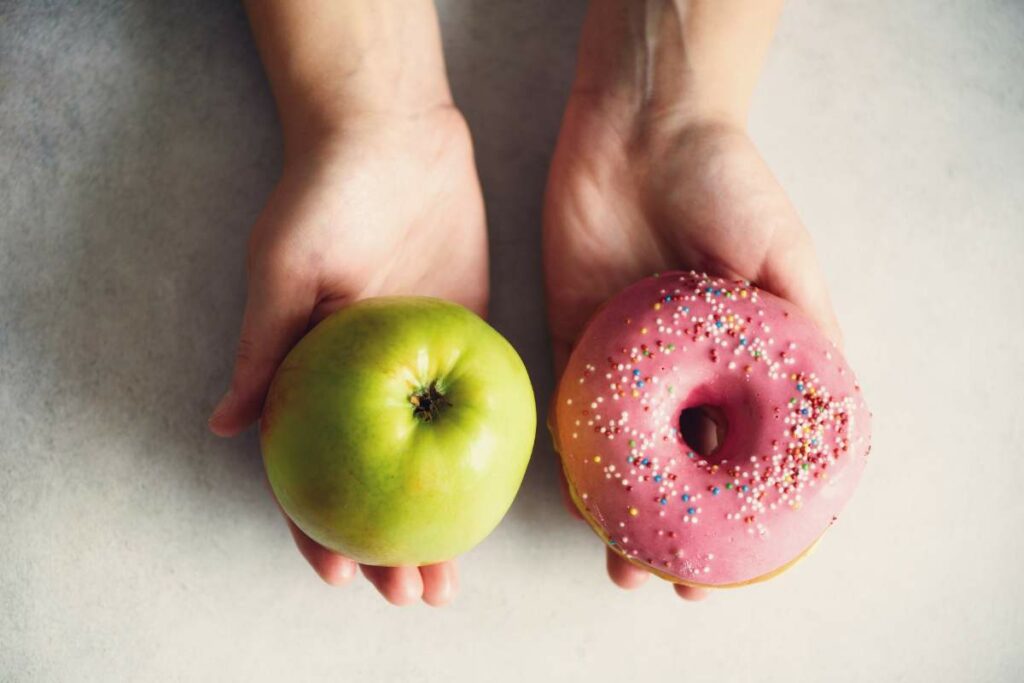
Blaming obesity on a lack of willpower is a gross oversimplification, akin to saying that your hair color can be changed by sheer determination.
The truth is, our weight is influenced by a myriad of factors, including genetics, hormones, and our environment, all of which intertwine in complex ways.
Genetics can predispose some of us to carry excess weight. Think of it like a starting line in a race — everyone’s different, and some may have to run a bit harder to keep the same pace.
For those who are genetically predisposed to store fat more efficiently, the race to maintain or lose weight might be a little more challenging, but it’s far from impossible.
Hormones also play a critical role in our weight. They regulate everything from our feelings of hunger and satiety to how we store and burn fat. If these hormones become imbalanced, they can make weight loss more difficult, even if you’re doing everything “right.”
Related Article: How Hormonal Changes Affect Weight Loss in Women
Our environment is another significant player. Living in a world where processed foods are easily available, physical activity is often optional, and stress is high can create a perfect storm for weight gain.
However, it’s important to note that while we may not have complete control over our genetics, hormones, or every aspect of our environment, we do have control over our behaviors and habits.
Instead of tying ourselves into knots of guilt for perceived lack of willpower, let’s focus on developing healthy habits that we enjoy and make us feel good.
This might mean finding physical activities we love, experimenting with cooking nutritious meals, seeking balance in our lives to manage stress, or ensuring we get enough sleep.
By focusing on what we can control and treating ourselves with kindness and compassion, we can build a healthier relationship with our bodies and navigate our unique weight loss journeys more successfully.

Embrace Your Journey: A Balanced Approach to Health
Let’s redefine our perception of health and weight loss. It’s not solely about the numbers on a scale or the size tag on your clothes.
Rather, your health journey is about embracing balance, fostering holistic well-being, and celebrating each and every step you take towards a healthier you. No victory is too small — they all add up!
As you embark on this journey, remember to exercise compassion towards yourself. Our bodies are beautifully complex and deserve our respect and kindness.
Let’s focus on feeling good, fueling our bodies with nutritious foods, and finding joy in movement, not just losing weight.
Ready to take your newfound knowledge and put it into action? Our 21-Day Fat Loss Challenge is the perfect springboard.

This is not your typical diet plan. It’s a lifestyle transformation that emphasizes sustainable, healthy habits that you can carry with you long after the challenge is over.
It’s time to feel empowered, beautiful, and unstoppable — because you are! Join us on this challenge, and let’s embrace the journey towards health and happiness together.
